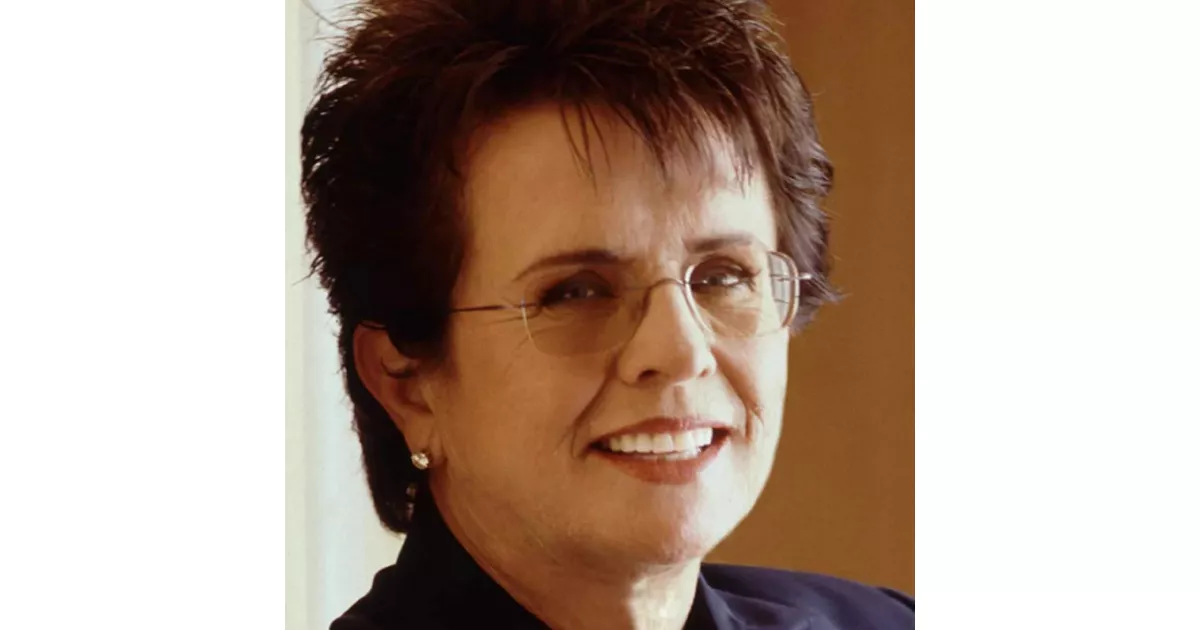Billie Jean King, a former world No. 1 American tennis player, achieved remarkable success with 39 Grand Slam titles, comprising 12 singles, 16 women's doubles, and 11 mixed doubles victories. She significantly contributed to the United States' triumphs in seven Federation Cups and nine Wightman Cups, solidifying her legacy as a dominant force in women's tennis.
1920: Oldest female semi-finalist at Wimbledon since Dorothea Douglass Lambert Chambers
In 1920, Dorothea Douglass Lambert Chambers was the oldest female semi-finalist at Wimbledon.
1939: Alice Marble's Accomplishment
In 1939, Alice Marble was the last woman to win the singles, women's doubles, and mixed doubles titles at both Wimbledon and the U.S. Championships before Billie Jean King matched this achievement in 1967.
1939: Bobby Riggs Wins Wimbledon
In 1939, Bobby Riggs won the Wimbledon men's singles title, a significant achievement early in his career.
1941: Bobby Riggs Ranked World No. 1
In 1941, Bobby Riggs was considered the World No. 1 male tennis player, highlighting his dominance in the sport.
November 22, 1943: Billie Jean King's Birth
On November 22, 1943, Billie Jean King (née Moffitt), the future world No. 1 tennis player, was born.
1946: Bobby Riggs Ranked World No. 1
In 1946, Bobby Riggs was considered the World No. 1 male tennis player, highlighting his dominance in the sport.
1947: Bobby Riggs Ranked World No. 1
In 1947, Bobby Riggs was considered the World No. 1 male tennis player, highlighting his dominance in the sport.
January 28, 1948: Birth of Marilyn Barnett
Marilyn Barnett, later Marilyn Kathryn McRae, was born on January 28, 1948.
1959: Early Career
From 1959 through 1965, Billie Jean King had thirteen unsuccessful attempts to win a Grand Slam singles title.
1959: Grand Slam Debut at U.S. Championships
In 1959, Billie Jean King made her Grand Slam debut at the U.S. Championships at the age of 15, losing in the first round. Her national tennis ranking was number 19.
1959: Grand Slam Debut
In 1959, Billie Jean King played her first Grand Slam singles event.
1960: First Tournament Win
In 1960, Billie Jean King won her first tournament at the Philadelphia and District Grass Court Championships and reached the final of the National Girls' 18 and Under Championships. Her national tennis ranking improved to number 4.
1961: Graduation from High School
In 1961, Billie Jean King graduated from Long Beach Polytechnic High School, marking the end of her secondary education.
1961: King's Debut at Wimbledon
In 1961, Billie Jean King made her debut at Wimbledon, marking the start of a long and successful career at the championships.
1961: Wimbledon Women's Doubles Title
In 1961, Billie Jean King, at age 17, gained international recognition by winning the women's doubles title at Wimbledon with Karen Hantze. They were the youngest team to win the Wimbledon Doubles Title.
1962: Singles Upset and Doubles Win at Wimbledon
In 1962, Billie Jean King upset Margaret Court, the World No. 1, at Wimbledon. That same year, King and Hantze repeated their doubles victory at Wimbledon.
1963: Wimbledon Final Loss to Margaret Court
In 1963, Billie Jean King faced Margaret Court in the Wimbledon final but was defeated, marking a significant match in their rivalry.
1963: Met Larry King
In 1963, Billie Jean King met Larry King in a library while attending Cal State LA. The pair became engaged while still in school.
1963: Federation Cup Win
In 1963, Billie Jean King was on the winning United States team at the Federation Cup.
1964: Commitment to Full-Time Tennis
In 1964, Billie Jean King decided to commit full-time to tennis, and she was offered financial support to train in Australia. She reached the Wimbledon semi-finals and lost to Margaret Court.
1964: Left College to Focus on Tennis
In 1964, Billie Jean King left Los Angeles State College (now California State University, Los Angeles) to focus on her tennis career, although she intended to return.
September 17, 1965: Marriage to Larry King
On September 17, 1965, Billie Jean Moffitt married Larry King in Long Beach. At the time of their marriage, Billie Jean was 20 and Larry was 19 years old.
1965: First Year Without a Grand Slam Since 1965
1969 was the first year since 1965 that Billie Jean King did not win at least one Grand Slam singles title.
1965: Early Career
From 1959 through 1965, Billie Jean King had thirteen unsuccessful attempts to win a Grand Slam singles title.
1965: Loss to Margaret Court in U.S. Championships
In 1965, Billie Jean King lost in the final of the U.S. Championships to Margaret Court despite leading in both sets. The United States Lawn Tennis Association overruled their ranking committee's recommendation to award her the sole U.S. No. 1 position and ranked Nancy Richey Gunter and King as co-U.S. No. 1.
1965: King's Return to Australian Summer Tour
In December 1967, Billie Jean King returned to the Australian summer tour for the first time since 1965. She participated in seven events, frequently competing against Judy Tegart, winning four of their matches. King did not win any titles that year, though.
1966: Start of Grand Slam Rivalry
From 1966 through 1975, Billie Jean King and Margaret Court were primary rivals in Grand Slam tournaments, winning 24 of the 40 events held during this period.
1966: World No. 1 Ranking
From 1966 through 1975, Billie Jean King was the year-ending World No. 1 in six of those years.
1966: Federation Cup Win
In 1966, Billie Jean King was on the winning United States team at the Federation Cup.
1966: Wimbledon Singles Title
In 1966, after thirteen unsuccessful attempts to win a Grand Slam singles title, Billie Jean King finally won her first singles title at Wimbledon, defeating Maria Bueno in the final. She defeated Dorothy "Dodo" Cheney and Margaret Court earlier in the year.
1967: Criticism of USLTA
In 1967, Billie Jean King criticized the United States Lawn Tennis Association (USLTA) for its "shamateurism", arguing that the practice of paying top players under the table was corrupt and elitist.
1967: King Defends Title and Wins Grand Slam
In 1967, Billie Jean King successfully defended her title at the South African Tennis Championships, defeating Maria Bueno. She played in the French Championships for the first time, reaching the quarterfinals. She also won all her matches at the Federation Cup. King won her second consecutive Wimbledon singles title, and secured her second Grand Slam singles title at the U.S. Championships without dropping a set. King achieved a rare feat, winning the singles, women's doubles, and mixed doubles titles at both Wimbledon and the U.S. Championships. To end the year, King lost to Tegart in the final of the South Australian Championships in Adelaide.
1967: Federation Cup Win
In 1967, Billie Jean King was on the winning United States team at the Federation Cup.
1968: Pre-Open Era Earnings
Before the start of the open era in 1968, Billie Jean King earned US$100 a week as a playground instructor and student at California State University, Los Angeles when not playing in major tennis tournaments.
1968: Attraction to Women
By 1968, Billie Jean King realized she was attracted to women.
1968: King Wins Australian Championships and Knee Surgery
In early 1968, Billie Jean King won three consecutive tournaments in Australia, including the Australian Championships for the first time. She continued her winning streak in the United States and Europe. At the US Open, she was upset in the final. On September 24, 1968, King underwent surgery to repair cartilage in her left knee, sidelining her for the rest of the year.
May 1969: Knee Recovery
According to Billie Jean King, it took eight months, until May 1969, for her knee to fully recover from the surgery she underwent in September 1968.
1969: King's Performance in 1969
In 1969, Billie Jean King participated in the Australian summer tour but did not win a tournament. She reached the final of the Australian Open, losing to Margaret Court. She won tournaments in South Africa and the United States. At Wimbledon, she lost in the final to Ann Haydon-Jones. King finished the year with titles at the Pacific Southwest Open, the Stockholm Indoors, and the Midland Pro.
September 1970: King's Activism and the Virginia Slims Invitational
In September 1970, Billie Jean King, along with eight other women, boycotted the Pacific Southwest Open due to the significant disparity in prize money between men and women. The top prize for men was $12,500, while for women it was only $1,500, with women not receiving expense coverage unless they made the quarterfinals. They organized the women-only Houston Virginia Slims Invitational, launching a series of women-only tournaments.
1970: King's Motivation for 1970
During the Pacific Southwest Open in 1969, Billie Jean King stated that she expected to have a big year in 1970 because she felt motivated and like a kid again.
1970: Margaret Court Wins Grand Slam
In 1970, Margaret Court won the Grand Slam, marking a significant achievement in her tennis career.
1971: King's Tournament Wins in 1971
1971 was the best year of Billie Jean King's career in terms of tournaments won, with a total of 17 titles. She played in 31 singles tournaments and had a win-loss record of 112-13.
1971: Start of Grand Slam Dominance
From 1971 through 1975, Billie Jean King began a period of dominance, winning seven of the ten Grand Slam singles tournaments she played.
1971: Affair with Marilyn Barnett
In 1971, Billie Jean King began an affair with her secretary, Marilyn Barnett.
1971: Formation of Women's Tennis Group
In 1971, Billie Jean King's husband, Larry King, conceived the idea to form a nine-player women's group with the backing of World Tennis magazine and Virginia Slims, marking a significant step towards professionalism in women's tennis.
1971: Abortion Made Public
In 1971, King had an abortion that was made public in a Ms. magazine article without her consent.
1971: Court misses significant portion of the year
In 1971, Margaret Court missed a significant portion of the tennis season due to childbirth.
1971: King's Decision Regarding the Australian Open
In 1972, Billie Jean King elected not to play the Australian Open, despite being nearby in New Zealand in late 1971.
1971: King Wins US Open and Earns $100,000
In August 1971, Billie Jean King won the US Open without losing a set. She also won tournaments in Houston, Indianapolis, Louisville, Phoenix, and London. King and Rosemary Casals defaulted at the Pepsi Pacific Southwest Open. In 1971, King became the first female tennis player to earn $100,000 a year, which earned her a congratulatory phone call from President Richard M. Nixon.
1971: King's Performance After Hurlingham Loss
In early May 1971, Billie Jean King lost to Christine Truman Janes at Hurlingham, but she recovered to win the German Open. She lost to Margaret Court at the Queen's Club tournament. At Wimbledon, she lost to Evonne Goolagong in the semi-finals. After Wimbledon, King won the Rothmans North of England Championships.
1972: Sports Illustrated Sportsman of the Year Award
In 1972, Billie Jean King was the joint winner, with John Wooden, of the Sports Illustrated Sportsman of the Year award, recognizing her achievements in tennis and her broader impact.
1972: King Wins French Open
In 1972, Billie Jean King won the French Open, completing a career singles Grand Slam.
1972: US Open Disparity in Prize Money
In 1972, Billie Jean King won the US Open but received US$15,000 less than the men's champion, highlighting the inequalities in prize money at the time.
1972: King Wins Three Grand Slam Titles in 1972
In 1972, Billie Jean King won three Grand Slam singles titles but chose not to play the Australian Open. Her dominance was aided by Margaret Court's absence due to childbirth.
1972: Career Grand Slam
In 1972, Billie Jean King's French Open win made her only the fifth woman in tennis history to win the singles titles at all four Grand Slam events, completing a "career Grand Slam".
1972: Court misses significant portion of the year
In 1972, Margaret Court missed a significant portion of the tennis season due to childbirth.
1972: King's Admission Regarding Retirement in St. Petersburg
In early 1972, Billie Jean King admitted that cramps associated with an abortion caused her to retire from the match with Chris Evert in St. Petersburg in 1971, despite initially claiming it was due to leg cramps.
September 20, 1973: Battle of the Sexes
On September 20, 1973, Billie Jean King defeated Bobby Riggs in the "Battle of the Sexes" match at the Houston Astrodome. The event garnered significant publicity and is considered a pivotal moment in promoting recognition and respect for women's tennis.
1973: First President of the Women's Tennis Association
In 1973, Billie Jean King became the first president of the Women's Tennis Association (WTA), marking a significant step in advocating for women's rights in tennis.
1973: King Completes Triple Crown and Defeats Riggs
In 1973, Billie Jean King completed the Triple Crown at Wimbledon, becoming the first player in the Open Era to do so. She also defeated Bobby Riggs in the Battle of the Sexes match. King won tournaments in Phoenix, Hawaii, and Tokyo and was the runner-up in Baltimore.
1973: King Defeats Bobby Riggs
In 1973, Billie Jean King defeated Bobby Riggs in an exhibition match, earning $100,000.
1973: Co-founding of World Team Tennis
In 1973, Billie Jean King's husband Larry co-founded World Team Tennis. Billie Jean King remained involved with the league for decades.
1973: Battle of the Sexes
In 1973, Billie Jean King, at the age of 29, famously won the "Battle of the Sexes" tennis match against 55-year-old Bobby Riggs. This event significantly contributed to her advocacy for gender equality. In 1973, she was also the founder of the Women's Tennis Association and the Women's Sports Foundation.
1973: Margaret Court's Dominance and King's Inconsistency
In 1973, Margaret Court won three Grand Slam singles titles, establishing herself as the world No. 1. Billie Jean King began the year inconsistently, missing tournaments due to a wrist injury, but later defeating Court in the semi-finals of the Virginia Slims of Indianapolis tournament, ending Court's winning streaks.
1973: Equal Prize Money at US Open
In 1973, the US Open became the first major tournament to offer equal prize money for men and women after Billie Jean King advocated for it.
1974: King's Tournament Successes and US Open Victory
In 1974, Billie Jean King won five of the first seven tournaments she entered, including the Virginia Slims of San Francisco. She won her fourth US Open singles title, defeating Evonne Goolagong in the final. However, she did not reach another tournament final for the rest of the year.
1974: Founding of womenSports Magazine and the Women's Sports Foundation
In 1974, Billie Jean King, along with her husband Larry King and Jim Jorgensen, founded womenSports magazine and started the Women's Sports Foundation, promoting women's sports and providing resources and opportunities for female athletes.
1974: WTT Began
In 1974, World Team Tennis (WTT) began.
1975: Height of Grand Slam Rivalry
From 1966 through 1975, Billie Jean King and Margaret Court were primary rivals in Grand Slam tournaments, winning 24 of the 40 events held during this period.
1975: World No. 1 Ranking
From 1966 through 1975, Billie Jean King was the year-ending World No. 1 in six of those years.
1975: Continued Grand Slam Success
From 1971 through 1975, Billie Jean King continued her dominance, winning seven of the ten Grand Slam singles tournaments she played.
1975: King's Wimbledon Victory and Temporary Retirement
In 1975, Billie Jean King only played singles for half the year, retiring from tournament singles competition after winning her sixth Wimbledon singles title.
1975: Time Person of the Year
In 1975, Billie Jean King was one of the Time Persons of the Year, acknowledging her significance and influence beyond the realm of sports.
November 1976: Knee Surgery
In November 1976, Billie Jean King underwent right knee surgery to repair an injury. She spent the first three months of the following year in rehabilitation.
1976: King's Previous Wimbledon Appearance
In 1976, Billie Jean King competed at Wimbledon where she reached a final. From 1961 until 1976, she had played in the final of one of the three championship events for women every year.
1976: Limited Singles Play and Knee Surgery
In 1976, Billie Jean King primarily focused on doubles and mixed doubles events, partnering with Phil Dent to win the mixed doubles title at the US Open. She underwent knee surgery for the third time on November 9 and did not play for the rest of the year.
1976: Federation Cup Win
In 1976, Billie Jean King was on the winning United States team at the Federation Cup.
March 1977: King Requests Wild Card and Plays in San Antonio
In March 1977, Billie Jean King requested a wild card entry to the Virginia Slims Championships. She also participated in the Lionel Cup tournament in San Antonio, Texas, which was criticized due to the inclusion of Renée Richards, a transgender athlete. King eventually won the tournament.
1977: Doctor's Prediction About King's Knee
In 1977, Billie Jean King revealed that in 1968, her doctors had predicted that her left knee would only allow her to play competitive tennis for two more years.
1977: Wimbledon Quarterfinal Loss to Evert
In 1977, at Wimbledon, Billie Jean King lost to Chris Evert in the quarterfinals, marking the first time she lost to Evert at a Grand Slam singles tournament and the first time at Wimbledon that King did not reach a final. This was the first time since 1961 that King did not reach a final at Wimbledon.
December 1978: Foot Surgery
In December 1978, Billie Jean King underwent major surgery on her left foot to attempt a return to the tennis tour.
1978: Singles and Doubles Play
In 1978, Billie Jean King participated in ten singles tournaments during the first half of the year. After Wimbledon, she limited herself to doubles.
1978: US Open Doubles Title and Federation Cup Victory
In 1978, Billie Jean King teamed with Martina Navratilova to win the women's doubles title at the US Open. She was also undefeated in five doubles matches as the U.S. won the Federation Cup in Melbourne, Australia. King also hinted at retirement from future major singles competitions due to continued surgery.
1979: Limited Play Due to Surgery
During the first half of 1979, Billie Jean King only participated in one event, doubles in the Federation Cup tie against Spain, due to her foot surgery in December 1978.
1979: Federation Cup Win
In 1979, Billie Jean King was on the winning United States team at the Federation Cup.
1979: 1979 Wimbledon quarterfinal
In 1979, Tracy Austin defeated Billie Jean King in the Wimbledon quarterfinal.
1979: Barnett Asked to Leave the Kings' House
In 1979, the Kings asked Marilyn Barnett to leave their house, but she refused and threatened to leak records and receipts.
1979: Top Players Choose King
In 1979, top players like Martina Navratilova and Rosemary Casals picked Billie Jean King as the player they would want to help them recover from a hypothetical deficit of 1–5 (15–40) in the third set of a match on Wimbledon's Centre Court, citing her resilience and skill under pressure.
1980: King Competes at Wimbledon Without Reaching Final
In 1980, Billie Jean King competed at Wimbledon but did not reach a final, breaking her streak of reaching a final every year since 1961.
1980: French Open Appearance and Quarterfinal Loss
In 1980, Billie Jean King played in the French Open for the first time since winning it in 1972. She was seeded second but lost in the quarterfinals to Dianne Fromholtz Balestrat.
May 1981: Palimony Lawsuit by Barnett
In May 1981, Marilyn Barnett sued the Kings for half their income and the Malibu house after a suicide attempt, leading Billie Jean King to publicly acknowledge the relationship.
December 1981: Court Order in Palimony Suit
In December 1981, a court order stipulated that Barnett leave the house. Barnett's threats to publish private correspondence between her and King in exchange for money was considered extortion.
1981: Final Grand Slam Title and Partnership Change
In 1981, Billie Jean King teamed with Martina Navratilova to win her 39th and final Grand Slam title at the US Open. Navratilova later decided to seek a new doubles partner, ending their partnership.
November 1982: Palimony Suit Dismissed
In November 1982, Barnett's palimony suit against King was thrown out of court.
1982: League commissioner of World TeamTennis
In 1982, Billie Jean King became the league commissioner of World TeamTennis, furthering her involvement in the sport's development.
1982: King Competes at Wimbledon Without Reaching Final
In 1982, Billie Jean King competed at Wimbledon but did not reach a final, marking one of the few times in her career where she didn't reach at least the semi-finals in an event.
1982: Comeback and Wimbledon semi-final
In 1982, King started a comeback, securing her first singles title in over two years at the Edgbaston Cup in Birmingham. She reached the semi-finals at Wimbledon, becoming the oldest female semi-finalist since 1920, before being defeated by Chris Evert. King ended 1982 ranked 14th in the world after beginning the year in retirement.
1982: King's Autobiography and Intentional Loss
In her 1982 autobiography, Billie Jean King claimed that she intentionally lost a match in Long Beach to Françoise Dürr due to an argument with her husband.
March 1983: House Destroyed by Storms
In March 1983, the house contested in the palimony suit was destroyed during a series of freak storms that lashed the southern California coastline.
1983: Final Wimbledon Appearance
In 1983, Billie Jean King made her final appearance at Wimbledon, reaching the semi-finals before losing to Andrea Jaeger.
1983: Last Grand Slam Singles Event
In 1983, Billie Jean King played her last Grand Slam singles event.
1983: Final Singles Match and Wimbledon Titles
In 1983, Billie Jean King won the Edgbaston Cup, becoming the oldest WTA player to win a singles tournament. Her final official singles match was a loss at the Australian Open. Also in 1983, King's tally of 20 Wimbledon titles remained.
1984: Wimbledon mixed doubles withdrawal
In 1984, Billie Jean King and Vijay Amritraj were seeded sixth for the Wimbledon mixed doubles, but they withdrew before the tournament began.
1984: Major Owner in World TeamTennis
In 1984, Billie Jean King became a major owner in World TeamTennis, increasing her influence and investment in the sport.
1984: King Interviewed after turning 40
In 1984, Billie Jean King gave an interview just after she had turned 40.
1987: Induction into International Tennis Hall of Fame
In 1987, Billie Jean King was inducted into the International Tennis Hall of Fame, recognizing her outstanding achievements and contributions to the sport.
1987: Marriage Ended
In 1987, Billie Jean and Larry's marriage ended after Billie Jean fell in love with her doubles partner, Ilana Kloss.
March 1990: Retirement from competitive play in doubles
In March 1990, Billie Jean King retired from competitive play in doubles after losing a second round match at the Virginia Slims of Florida tournament.
1990: Induction into National Women's Hall of Fame
In 1990, Billie Jean King was inducted into the National Women's Hall of Fame, honoring her contributions to gender equality and women's rights.
1996: Fed Cup Championship and Olympic Gold Medals
In 1996, Billie Jean King guided the U.S. to the Fed Cup championship and helped Lindsay Davenport, Gigi Fernández, and Mary Joe Fernández capture Olympic gold medals as coach of its women's Olympic tennis squad.
1999: Election to Philip Morris Board of Directors
In 1999, Billie Jean King was elected to the board of directors of Philip Morris Incorporated, which garnered criticism from anti-tobacco groups.
2002: Capriati Dismissal from Fed Cup Team
In 2002, Billie Jean King dismissed Jennifer Capriati from the Fed Cup team for violating rules about personal coaches, sparking controversy.
2006: USTA National Tennis Center Renamed
In 2006, the USTA National Tennis Center in New York City was renamed the USTA Billie Jean King National Tennis Center, a tribute to her lasting impact on tennis.
2008: Sports Museum of America
In 2008, Billie Jean King became a member of the Board of Honorary Trustees for the Sports Museum of America, which houses the Billie Jean King International Women's Sports Center.
2010: Fed Cup Award of Excellence
In 2010, Billie Jean King was bestowed the Fed Cup Award of Excellence, honoring her exceptional record and impact in the Federation Cup competition.
2012: Involvement with Foundations and President's Council
As of 2012, Billie Jean King was involved with the Women's Sports Foundation and the Elton John AIDS Foundation. She also served on the President's Council for Fitness, Sports and Nutrition.
December 2013: Appointment to 2014 Winter Olympics Delegation
In December 2013, US President Barack Obama appointed Billie Jean King to represent the United States at the 2014 Winter Olympics in Sochi, Russia, viewed as a statement on gay rights.
February 7, 2014: Death of Betty Moffitt
On February 7, 2014, the day of the 2014 Winter Olympics opening ceremony, Billie Jean King's mother, Betty Moffitt, passed away.
June 16, 2017: Northwestern University Commencement Address
On June 16, 2017, Billie Jean King delivered the commencement address at Northwestern University in Evanston, Illinois.
2017: King sold her ownership stake of WTT
In 2017, Billie Jean King sold her majority ownership stake of the World Team Tennis league to Mark Ein and Fred Luddy.
September 2018: Minority Ownership of Los Angeles Dodgers and Sparks
In September 2018, Billie Jean King and Ilana Kloss became minority owners of the Los Angeles Dodgers baseball team and the WNBA's Los Angeles Sparks basketball team.
October 18, 2018: Marriage to Ilana Kloss
On October 18, 2018, Billie Jean King and Ilana Kloss were married in a secret ceremony performed by former New York City Mayor David Dinkins.
2018: Guest at the 75th Golden Globe Awards
In 2018, Billie Jean King attended the 75th Golden Globe Awards as a guest of Emma Stone.
2018: BBC Sports Personality of the Year Lifetime Achievement Award
In 2018, Billie Jean King won the BBC Sports Personality of the Year Lifetime Achievement Award, celebrating her career achievements and influence.
October 2020: Ownership in Angel City FC
In October 2020, Billie Jean King and Ilana Kloss joined the ownership group of Angel City FC, a Los Angeles-based team in the National Women's Soccer League.
2020: Federation Cup Renamed Billie Jean King Cup
In 2020, the Federation Cup was renamed the Billie Jean King Cup in her honor, recognizing her contributions to the competition and to women's tennis.
May 2022: Partnership with PWHPA
In May 2022, The Mark Walter Group and BJK Enterprises partnered with the Professional Women's Hockey Players Association (PWHPA) to create a new women’s ice hockey league in North America.
2022: Start of Angel City FC
In 2022, Angel City FC, of which Billie Jean King is part of the ownership group, was set to start playing in the National Women's Soccer League.
2022: Awarded French Legion of Honour
In 2022, Billie Jean King was awarded the French Legion of Honour, acknowledging her impact and influence on a global scale.
June 29, 2023: Purchase of Premier Hockey Federation
On June 29, 2023, The Mark Walter Group and BJK Enterprises, headed by Mark Walter and Billie Jean King, respectively, purchased the Premier Hockey Federation (PHF).
2023: The Masked Singer
In 2023, Billie Jean King competed in season ten of The Masked Singer as "Royal Hen" and was eliminated on "A Celebration of Elton John".
January 1, 2024: Start of new hockey league
On January 1, 2024, the new women's ice hockey league began its operations, with the first game played between New York and Toronto in Toronto.
2024: Value of First Racket
In 2024 terms, Billie Jean King saved $8 to buy her first tennis racket, which would be equivalent to $92.40 today.
2024: Received Congressional Gold Medal
In 2024, Billie Jean King received a Congressional Gold Medal, recognizing her significant contributions to sports, gender equality, and social justice.
2024: Value of 1973 Prize Money in 2024
In 2024, the $100,000 prize Billie Jean King won in 1973 after defeating Bobby Riggs is equivalent to $707,000 in 2024 terms.
2025: Return to College
In 2025, Billie Jean King planned to return to school with the intention of finishing her degree she started at Los Angeles State College.
Mentioned in this timeline

Sir Elton John is a highly successful British singer songwriter...

Barack Obama the th U S President - was the...
California is a U S state on the Pacific Coast...
Sports Illustrated SI is an American sports magazine launched in...
New Zealand is an island country in the southwestern Pacific...

Los Angeles is the most populous city in California and...
Trending

38 minutes ago Ryan Hurst's Kratos Revealed in Prime Video's 'God of War' Series: Cast Updates

38 minutes ago Cowboys to Franchise Tag George Pickens for $28 Million: A Bold Move

38 minutes ago Rublev dominates Rinderknech, secures Dubai 2026 SFs spot; stats rival Djokovic, Federer.
19 hours ago Dell Projects AI Server Boom to Spur $50 Billion in Sales by 2027

2 hours ago Official Pokémon LEGO Sets Launch Worldwide on Pokémon Day 2026!

2 hours ago Scream 7 Premiere Sees Protests After Melissa Barrera's Firing; Cast Reunites.
Popular

Jesse Jackson is an American civil rights activist politician and...

Barack Obama the th U S President - was the...

Susan Rice is an American diplomat and public official prominent...

XXXTentacion born Jahseh Dwayne Ricardo Onfroy was a controversial yet...

Michael Joseph Jackson the King of Pop was a highly...

Kashyap Pramod Patel is an American lawyer who became the...

